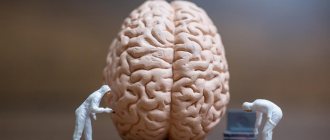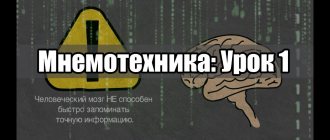The newspaper editor was furious - his young employee left the meeting, defiantly without writing down a single line from the verbose and multi-point instructions dictated by the editor at the meeting. Calling the careless intern on the carpet, he tried to reprimand him. However, he had to be quite surprised when all his instructions were literally reproduced point by point by Solomon Shereshevsky from memory.
He had a phenomenal memory, so much so that he became the object of scientific study by psychologist Alexander Luria for 30 years, after which the scientist refused to find the limits of his memory - there were none!
The secret of his abilities was synesthesia - when the senses interact together, which most inhabitants of the Earth do not have. As a result, his sensory memory transferred information to the short-term, and that to the long-term with incredible strength.
Not everyone is able to remember this way, but you can improve your short-term memory by doing exercises.
Content
- Short-term memory. Principle of operation
- The difference between short-term memory and working and long-term memory types
- Other types of memory
- Recommendations for improving short-term memory
- Exercises to develop short-term memory
If you've ever studied for an exam in one or two nights, you know how much information the human brain can hold, and how quickly what is memorized is forgotten later. This is how one of our types of memory works—short-term memory.
Short-term memory is an intermediate “storage” of data in which information entering the brain is stored before it is transferred to long-term storage or is completely forgotten.
Maintain a healthy sleep pattern
The only time our minds rest is when we sleep. Well, it would be technically incorrect to say that the mind is at rest when we sleep. Even then, the brain carries out different processes, such as breathing. But when we sleep, this is the only state when our brain cannot actively absorb and process information.
Research has shown that adequate sleep improves various brain functions. The same is true for our memory. A tired brain is terrible at storing and processing information. This is why if you want to improve your short-term memory, then you must have a healthy sleep pattern.
Short-term memory. Principle of operation
As the name implies, memories are here for quite a short time - from a few seconds to several days. It happens like this:
The brain processes signals coming to it from various sources and stores them as long as they are needed for a task. The main mechanism for storing information at this stage is simple repetition. By stopping repetition, a person, as a rule, begins to forget what he remembers, thus freeing up space for storing new data that seems more relevant to him.
The capacity of short-term memory is also small. On average, this is 7 + -2 units of information - the Miller number, identified experimentally.
Meditate
Important aspects of meditation are learning to control your thoughts and being aware of your surroundings. It also helps clear your brain of negative or unimportant thoughts. So, practicing meditation will help you filter what is important and what is not. Once you have weeded out all the unnecessary information from your brain, important information becomes easy to store.
Meditation is often depicted as an upright posture with folded legs and outstretched arms. However, meditation is not just about posture; it is a technique that can be used anywhere and anytime.
The best way to start practicing meditation is to meditate for a few minutes every day in bed, both before going to bed and when you wake up in the morning. [2]It is easy and simple to practice.
The difference between short-term memory and working and long-term memory types
Since short-term memory is closely related to performing a task - for example, learning a ticket for an exam, or remembering a shopping list that needs to be purchased in the near future, it is closely related to operative (working) memory.
At the same time, RAM allows you to work with data entered into short-term memory - it will tell you the digits of a telephone number so that you have time to write them down, or it will remind you why you went into another room - and then erase the information that is no longer needed.
But why do we still remember that 2*2=4, that our beloved grandmother’s birthday is in June, or that Archimedes shouted “Eureka!”? The fact is that these and other similar facts have passed into long-term memory. This is where the data that we have repeated enough times is stored to convince the brain of its importance and relevance.
Thus, short-term memory is the golden mean that lies between operational and long-term types of memory and “filters” necessary memories from unnecessary ones, preserving the first and erasing the second.
Categorize information
Divide information into similar categories to help you remember it. Let's look at an example of remembering a nine-digit phone number. If you try to remember a whole number in one go, it will become difficult and you may get the numbers mixed up. But if you divide the number into groups of three, it becomes easy to remember.
Now let's say you want to remember a list of items you can get at a grocery store. Separate these items into categories, such as fruits, canned or packaged foods, tools, and so on. This way, it will become easy to remember which items are in each category. This technique of categorizing objects is also called chunking.
Other types of memory
Of course, there are other types of memory. For example:
- Sensory
This is where signals from the senses, fleeting sensations, are received to subsequently be transformed into material for short-term memory. - Mechanical memory
It allows the body to move, function and take the desired position, automatically. It is thanks to her that we do not forget how to walk or, say, sit on a chair. - Emotional memory
It specializes in previously experienced feelings and emotions. - Logical memory
Storing data in blocks. For example: not just a food market, but where it is located, what is sold there, what are the prices, which seller is better to buy goods from...
Read more about different types of memory.
However, these types of memory are more related to the sources of memories or to the mechanisms of perception, and speaking of storage periods, dividing memory into operational, short-term and long-term is more appropriate.
Read, write, speak and listen
Most of the information our brain receives is in some form of language. Messages, lectures, conversations and many other everyday aspects of our lives use language.
When we read, write, speak or listen, we process the information we receive. The more we engage in this activity, the faster our brain begins to process it.
In short, when you actively spend time reading, writing, or communicating with others, you understand and retain information better. So what exactly can you do? Start reading more, write a journal and try to communicate more with others.
Recommendations for improving short-term memory
Short-term memory can and even needs to be developed. This will help not only learn how to retain the necessary memories, but also avoid all kinds of memory disorders in old age. There are several simple ways you can change your mental flexibility and speed of thinking.
- Attention training
- Using mnemonics
- Proper nutrition and physical activity
Let's look at each of these tips in more detail.
- Attention training
Working memory and short-term memory require full involvement in the process being performed. Voluntary attention directed to an object associated with memorization helps to better remember the material, and then transfer it to long-term memory. That is why exercises aimed at developing attention will have a beneficial effect on memory. - Using mnemonics
Mnemonic techniques are recommended for those who have pronounced problems with short-term memory. They also help transfer information into long-term memory, having a positive effect on the speed and quality of memorization. Such techniques work like this: unfamiliar and/or abstract concepts must be transformed into concrete and understandable association images. In this way, unfamiliar data is firmly connected with those that are already stored in memory, and the information is consolidated as quickly as possible and is not forgotten. - Proper nutrition and physical activity.
Correct from the point of view of the needs of the brain. It is known that improving memory - both short-term and long-term - is positively influenced by the consumption of certain foods:- containing B vitamins (especially B6, B9, B12): green vegetables, protein products, honey.
vitamins C, E and beta-carotene. They are found in berries and freshly squeezed juices.
- fatty acids and Omega-3. Their sources are sea fish and walnuts.
It is important to remember that eating a handful of nuts is not enough to instantly improve your memory. Only daily systematic consumption of necessary products will give a good effect in the long term.
As for physical activity, simple exercise and walks in the fresh air provide the brain with oxygen and nutrients, which has a beneficial effect on its functioning in general and on memory abilities in particular.
How to Improve Memory: 6 Steps
Here are six points that I advise you to improve your quality of life and memory.
Maintain a sleep schedule
Try to maintain a sleep schedule. Sleep not only helps you stay alert, but also improves your memory. Sleep is an integral and important part of human life. The quality of your wakefulness depends on the quality of your sleep. How the body rests at night determines how it will function during the day.
Proper sleep is a source of great mood, good health and, of course, beauty.
Repeat information
Repeat what you need to remember several times (preferably out loud). Don't be afraid to ask again or clarify. First of all, this is necessary for you. Don't be afraid of what others will think.
Try to reread and revise what you need to remember. Try to take small notes and analyze the information. This will not only improve your memory, but also teach you discipline. Discipline is a tool for achieving success.
Information and the brain: 10 rules for not overloading yourself with data and avoiding stress
Focus on the goal
Try not to focus on unnecessary things. Focus your attention on achieving your goal. There are three stages to achieve the goal.
- Plan. Make lists. The first is what do I want to achieve in life? Minimum 10 points (answers). Second - what do I need to do for this? Also 10 points. This is necessary for you to understand where you need to move in personal growth.
- The difficulties you will face. Remember that without falls there is no take-off. Be firm in your decision. Only through pain and suffering will you feel the taste of victory over yourself and achieve success and recognition.
- Encouragement. Write 10 points of encouragement. Let it be something useful and pleasant: a cup of coffee after a morning run, for example. After all, in order to achieve something, you must work on yourself every day. And it is important to reward yourself for the work done so that it is a pleasure.
Develop imagination
Imagination is a person’s ability to spontaneously create or deliberately construct images, ideas, ideas, objects that, in the experienced experience of the imaginer, were not previously perceived in their entirety or cannot be perceived at all through the senses. For example, events of history, the supposed future, phenomena of an imperceptible or non-existent world: supernatural characters in fairy tales and myths.
This human ability to create images, ideas, ideas and manipulate them plays an important role in such mental processes as modeling, planning, creativity, play, memory, thinking.
Here's an exercise to develop your imagination. Take at least five minutes a day to close your eyes and imagine an apple on your plate.
Avoid stress and negativity
Avoid stress and negative emotions. They have a bad effect on memory. Stress destroys the nervous system and the body as a whole.
All thoughts are material, that is, what we think comes true. Life depends on our thinking. Therefore, it is important to learn to “filter” your thoughts. Example. We say: “You need to save money for a rainy day.” I think if you think and talk like this, then sooner or later a dark day will come. In my opinion, it is better to say: “I am saving money in order to benefit myself and others in the future.”
You need to understand whether you really need to accumulate savings.
Pray and give thanks
Pray. Thank God (the Universe or whatever you believe in) for everything He gives you. Ask Him for strength, protection, patience, wisdom.
I hope my advice will help you change your life. Your future depends only on you! But don’t be afraid to ask for help and support from your loved ones and relatives, don’t refuse when they offer you help. Popular wisdom says: “Don’t have a hundred rubles, but have a hundred friends.” Remember that with God everything is possible!
Exercises to develop short-term memory
To develop short-term memory, it is necessary to regularly train it with the help of special exercises aimed at strengthening both memory and attention.
Attention exercises
- Mental arithmetic Solve simple mathematical examples at speed within 3-5 minutes. This will help you learn to remember answers quickly and not get distracted.
- Correction tests Practice finding certain letters or symbols in a field with similar signs for speed.
- Find the Differences Practice finding the differences between pictures. This will teach you to be attentive to details.
Consequences of memory loss
If temporary amnesia is not treated in time, it will lead to negative consequences:
- in neurodegenerative conditions that are not detected in time, the death of neurons continues, which causes Parkinson’s or Alzheimer’s disease;
- loss of information (memories of children, data from work);
- the occurrence of situations that threaten the patient’s life;
- progression of a systemic disease that is not detected in time worsens the patient’s well-being, in extreme cases causing his death;
- severe stress, depression, insomnia, nervous breakdown;
- exhaustion of the body due to insufficient supply of nutrients, leading to hormonal imbalance, anorexia.
Periodic loss of short-term memory is an alarming signal about disorders in the body. Therefore, it is necessary to consult a doctor, even if this happens once.
Interesting: Stroke in diabetes mellitus and its consequences











